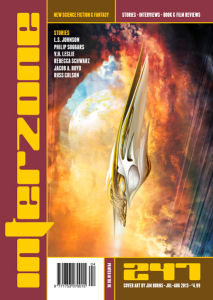Reviewed by Chuck Rothman
The July/August issue of Interzone concentrates on delivering strong emotional experiences in its six stories.
L.S. Johnson’s “The Pursuit of the Whole is Called Love” is about Cam and Jess, two shapeshifters who go out in the world, but who switch off as to who is female and who is male. Problems occur for the usual human reason: a human male named Dave starts to come between them and Jess tries to go back to where it was before they met him. The stress on the relationship is a strong center of the story, which handles the situation well and is filled with imagination.
“Automatic Diamanté” is a new take on the old trope of a computer becoming self-aware. The narrator is that computer, dealing with its new-found feelings and trying to find out what it is to be human, and looking at his psychiatrist Derrida for answers and eventually discovers a dark secret. Philip Suggars makes the most of the trope, but I found the story lets us discover things without being engaging.
Jacob A. Boyd has a clever concept in “Just as Good”: The Exchange, an alien presence who shows up at your door (with a human turned into his puppet) to take something from you – and give you something else in return. Sometimes it’s something trivial. Sometimes, it’s your mother. Tara finds that happening to her, with a woman from Australia taking her mother’s place. I liked the concept and the way that Boyd develops the central idea, but the ending shrugs off the conflict involved.
“The Cloud Cartographer” by V.H. Leslie also has a fascinating concept, where clouds have taken on solidity. Ahren has been sent off on a project to create a map of them. I don’t find that the story does all that much with the idea, however. Ahren keeps up his task, and even finds some surprises, but the tedium of the task bleeds through to the story, and Ahren’s moping behavior makes it a chore to read and the story goes on for too long.
I felt extremely frustrated by “Futile the Winds.” It, too, is a great situation: Leigh and Jack are two people out to colonize Mars, but the colony is failing as they starve to death as their food supplies run out. Leigh is the botanist, trying to breed their plants to survive and who succeeds in a bizarre way. There is much I liked about the situation and the weirdness of it all, but Rebecca Swartz chooses what is essentially a truck ending (“Suddenly, everyone was run over by a truck.”) The conflicts and confusions that were inherent in the story give way to a cheap futile ending, and everything that happens in the story is trivialized.
Russ Colson contributes the story of a man who is turned into a frog. But “The Frog King’s Daughter” is clearly science fiction. Arnie Ashton, a powerful CEO, has his consciousness transferred into a frog as a bet. Unfortunately, the man who did it dies in a car accident, and he can’t change back. He lives in a pond owned by his daughter and successor, Amy, and overhears a threat on her life. The story is well constructed and far more traditional in structure, but is basically a good story well told, with strong emotions and a satisfying ending.
All the stories in Interzone start out with concepts that are imaginative and thoughtful; the things I didn’t like were all in the execution. In most, there’s a sense of dull malaise, which I find tiresome in large doses.
Chuck Rothman‘s novels Staroamer‘s Fate and Syron‘s Fate were recently republished by Fantastic Books.
